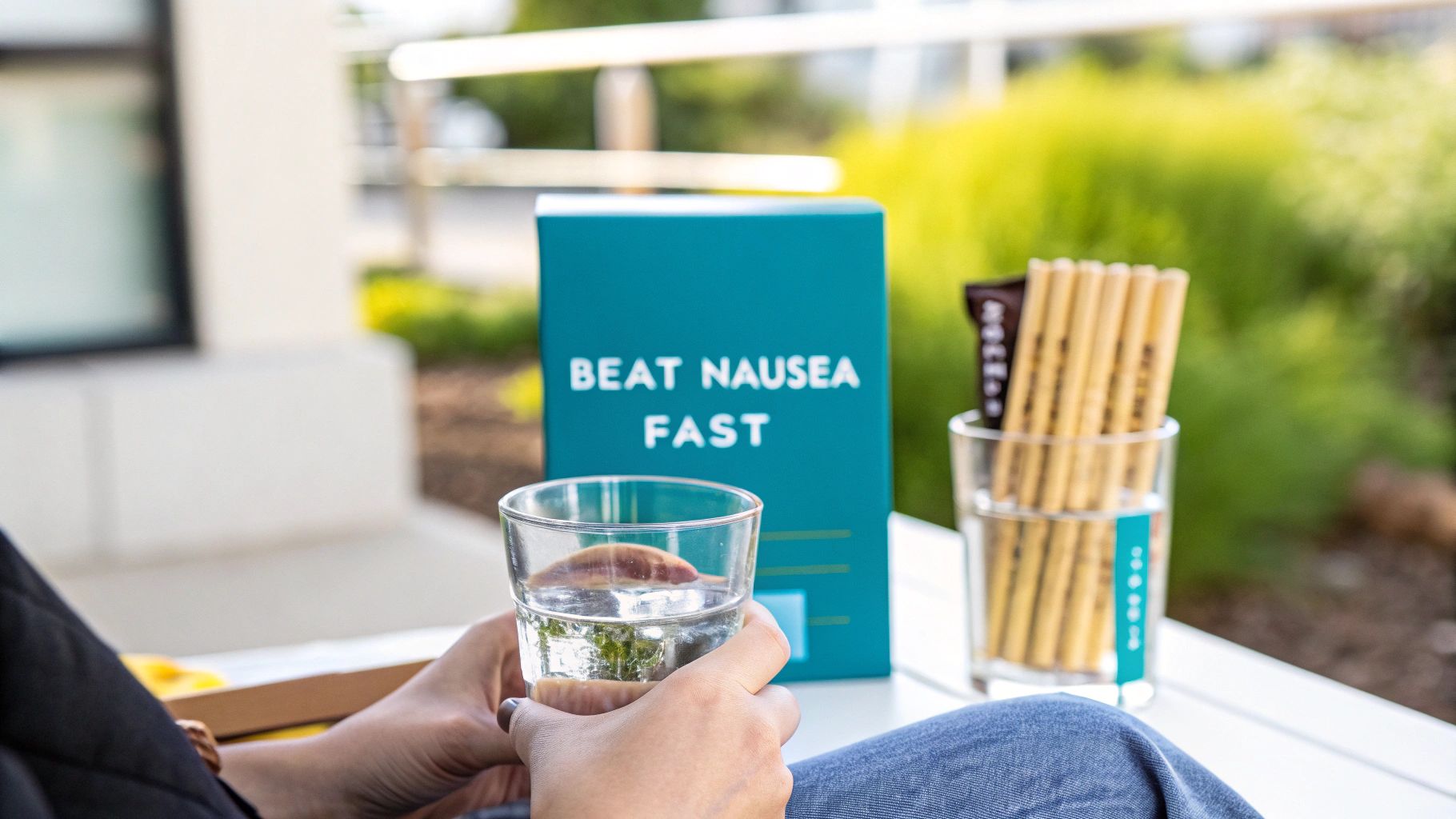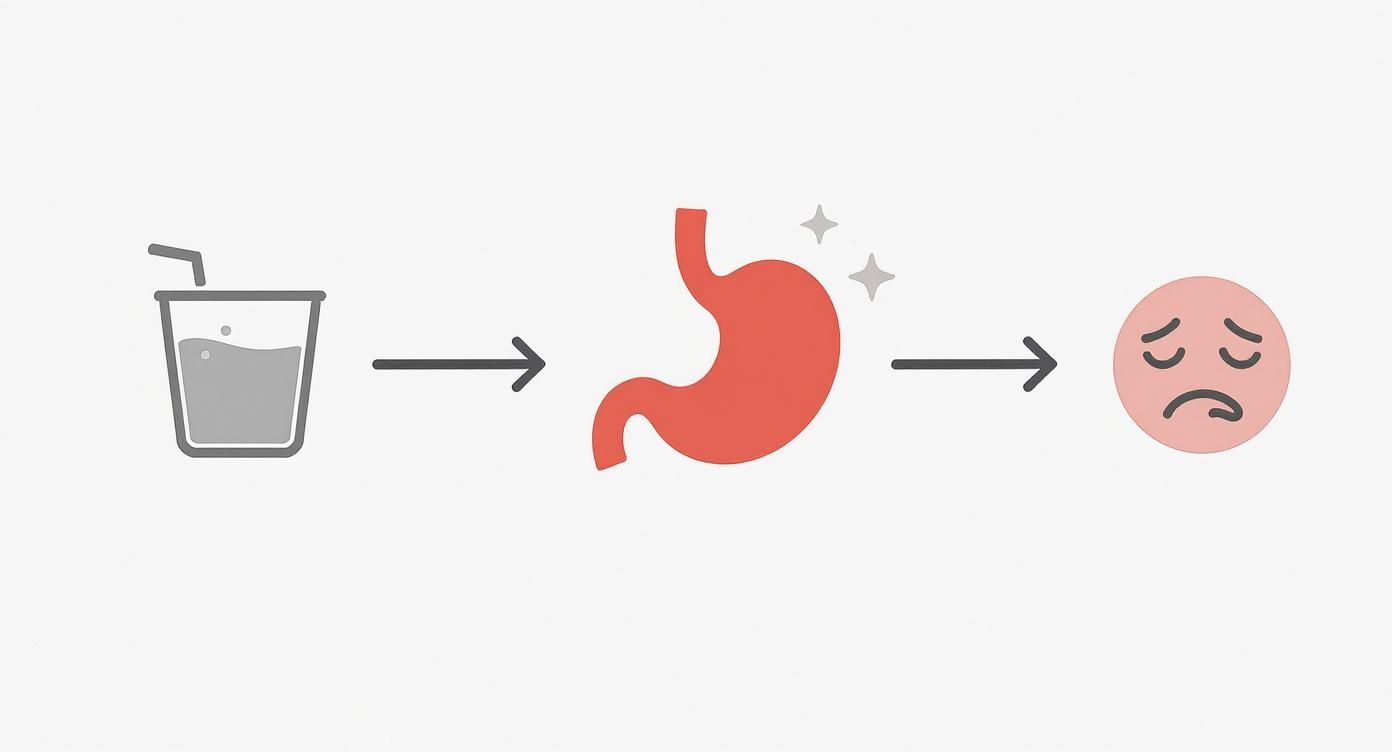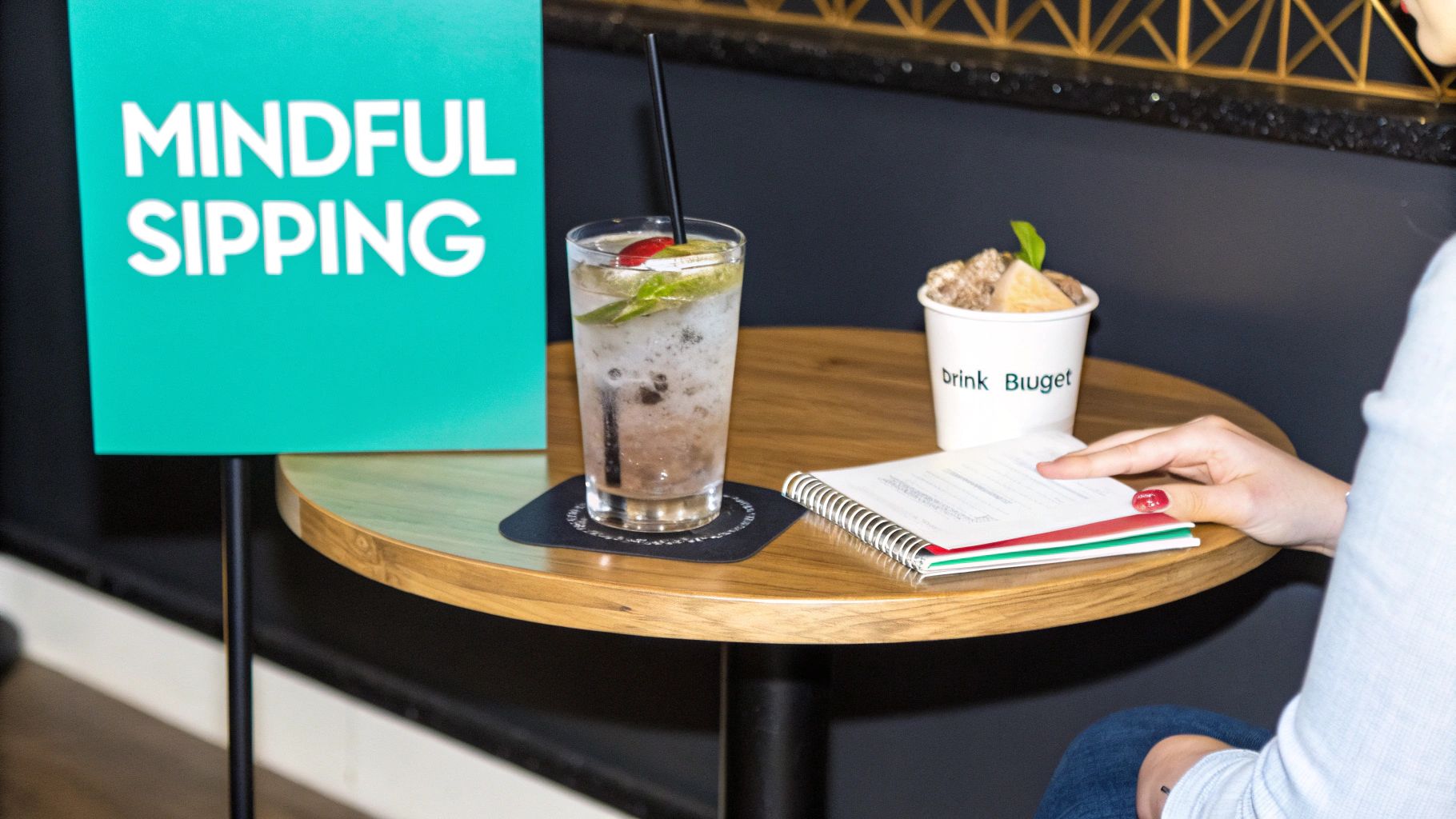

· By Annemarie
How to Stop Nausea From Alcohol Feel Better Fast
If you want to stop that awful, queasy feeling from alcohol, you first have to understand where it comes from. It’s really a two-pronged attack: the alcohol directly irritates your stomach, and then your body creates a toxic compound called acetaldehyde as it tries to process what you drank.
Once you get a handle on those two things, you can actually do something about it. By focusing on hydration, what you eat, how you drink, and giving your body a little metabolic support, you can seriously cut down on—or even completely sidestep—that dreaded nausea.
Why Alcohol Really Makes You Nauseous
Ever wondered what’s actually going on inside your body when that familiar wave of nausea hits after a few drinks? It’s an all-too-common feeling, but there's more to it than just "drinking too much." That sick feeling is your body's response to alcohol hitting it from two different angles, messing with both your stomach and your brain.
The Direct Hit on Your Stomach
First things first, let's talk about what happens the moment alcohol enters your system. When you take a sip, it makes direct contact with your stomach lining, and it's not a friendly visit. Alcohol is a serious irritant, and it signals your stomach to go into overdrive and produce way more acid than it normally would.
This sudden spike in stomach acid can lead to an inflamed stomach lining, a condition known as gastritis. The symptoms are probably what you're imagining: stomach pain, general discomfort, and that unmistakable urge to be sick. Even a moderate amount of drinking can increase your risk for acid reflux, which is a major contributor to that unsettled feeling. This irritation essentially damages the protective layer in your stomach, sending alarm bells to your brain that something’s not right.
If you want to get into the nitty-gritty of it, our guide on what causes hangovers breaks down the science even further.
The Toxic Culprit Acetaldehyde
While the irritation in your stomach is a big part of the problem, the issue that affects your whole system comes down to how your body breaks alcohol down. As your liver gets to work metabolizing alcohol, it converts it into a chemical called acetaldehyde.
Acetaldehyde is a nasty, highly toxic compound—even more toxic than alcohol itself. It’s one of the main villains behind many hangover symptoms, especially nausea. Your body basically recognizes it as poison and wants it out, immediately.
Normally, your liver is armed with an antioxidant called glutathione, which is supposed to neutralize acetaldehyde. The problem is, when you drink faster than your liver can produce glutathione, your supply runs out. This lets toxic acetaldehyde build up in your blood, which then triggers a part of your brain called the "chemoreceptor trigger zone." This is your body's poison control center, and it’s responsible for making you feel nauseous and wanting to vomit. It’s your body’s last-ditch effort to get rid of the toxins.
This double-whammy of stomach irritation and acetaldehyde buildup is the core reason you feel so sick. Let's break down those triggers.
Key Causes of Alcohol-Induced Nausea
To put it simply, your body has a few very good reasons for making you feel nauseous when you drink.
| Biological Trigger | How It Causes Nausea |
|---|---|
| Increased Stomach Acid | Alcohol directly irritates the stomach lining, causing it to produce excess acid. This can lead to gastritis, inflammation, and discomfort. |
| Delayed Stomach Emptying | Alcohol slows down the rate at which your stomach empties its contents, leaving food and alcohol sitting there longer and contributing to bloating and nausea. |
| Acetaldehyde Buildup | When the liver breaks down alcohol, it produces this toxic compound. Too much of it overwhelms your system and triggers the brain's "vomit center." |
| Brain and Inner Ear Disruption | Alcohol can mess with your brain and inner ear, which control balance. This disruption can lead to dizziness and motion sickness-like nausea. |
Understanding these biological responses is really the first step. According to the National Institute on Alcohol Abuse and Alcoholism, this combination of irritation and increased acid production is a primary cause of nausea for many people who drink.
Prepare Your Body Before You Drink
The best way to stop alcohol-induced nausea is to get ahead of it. Seriously. A little strategic thinking before you even take that first sip can make a world of difference. It sets your body up for success instead of leaving it to play defense later on.
This isn't about skipping the fun; it's about being smart so you can actually enjoy your night and the morning after. By focusing on smart nutrition, proper hydration, and some proactive support, you give your body the tools it needs to process everything more efficiently. This whole approach helps minimize the stomach irritation and toxic buildup that lead to that queasy, awful feeling.
Fuel Up the Right Way
First rule of a good night out: Never drink on an empty stomach.
Food acts as a buffer, slowing down how quickly alcohol gets absorbed into your bloodstream. But not just any meal will do. The goal is to eat a balanced meal about an hour before you start drinking.
You want a solid combination of these key players:
- Lean Protein: Think chicken, fish, or tofu. These help slow down digestion.
- Healthy Fats: Avocado, nuts, or a drizzle of olive oil are great choices for lining your stomach.
- Complex Carbohydrates: Sweet potatoes or brown rice provide sustained energy and keep you grounded.
This trifecta ensures a slower, more gradual absorption of alcohol, which prevents that rapid spike in blood alcohol that can overwhelm your system and trigger nausea. A meal like grilled salmon with quinoa and a side of avocado is pretty much the perfect pre-drinking powerhouse.
The infographic below breaks down how alcohol consumption leads directly to stomach irritation and that dreaded queasy feeling.

As you can see, by irritating the stomach lining, alcohol sets off the very first domino that leads to feeling sick.
Hydrate Before You Dehydrate
This one's a biggie. Alcohol is a diuretic, which is just a fancy way of saying it makes you pee out fluids faster than usual. Walking into a party or bar already a bit dehydrated is a recipe for a bad time.
Pre-hydration is your secret weapon.
Don't just chug a bottle of water right before you walk out the door. The real move is to make a conscious effort to drink water consistently throughout the day. For bonus points, add an electrolyte drink mix. It helps your body actually hold onto that hydration and replaces key minerals that alcohol is about to deplete.
Give Your Liver Some Proactive Support
Your liver does all the heavy lifting when it comes to breaking down alcohol. Giving it a helping hand beforehand can significantly cut down your chances of feeling sick later. This is where targeted supplements come into play.
Products like Upside Hangover Sticks are designed for this exact scenario. They’re packed with powerful, natural ingredients that support your body’s detoxification process from the get-go. For a deeper dive, check out our guide on how to prepare for drinking.
The key ingredients are there for a reason:
- Dihydromyricetin (DHM): This plant extract is a game-changer. It helps your liver break down acetaldehyde—the main toxic byproduct of alcohol—way more quickly.
- Milk Thistle: This is a well-known herb that’s famous for supporting liver health and function, helping it perform at its best when it's under stress.
Taking a supplement like Upside before you start drinking gives your body the backup it needs to handle alcohol more efficiently. You're directly targeting the root causes of nausea before they can even get started.
Master Mindful Drinking Habits
What you do while you're drinking can be just as important, if not more so, than all the prep work you did beforehand. When it comes to stopping nausea from alcohol, it really boils down to being strategic in the moment.
This isn’t about cutting yourself off or being the fun police. It's about making smarter, more mindful choices so your body doesn't get completely overwhelmed.
The name of the game is managing your blood alcohol concentration (BrAC) and preventing it from spiking too quickly. A rapid jump in BrAC is a one-way ticket to Nausea Town because it floods your system with alcohol and its nasty byproducts faster than your liver can possibly keep up. By adopting just a few simple habits, you can keep things steady and actually enjoy your night without paying for it later.

Pace Yourself with Purpose
I'm going to say it plainly: slowing down is the single most effective way to avoid feeling sick. When you drink too fast, you're not giving your body a fighting chance to process the alcohol. That queasy, I-made-a-huge-mistake feeling is practically inevitable.
A fantastic, real-world strategy is the 'one-for-one' rule. Seriously, try it. For every alcoholic drink you have, follow it up with a full glass of water. It's a simple trick that pulls double duty:
- It keeps you hydrated, directly fighting one of alcohol's biggest knockout punches.
- It naturally spaces out your drinks, giving your liver more time to do its job and stopping a rapid BrAC spike in its tracks.
It’s not just about how much you drink, but how fast you drink it. Research actually shows that your peak blood alcohol level is a better predictor of nausea than the total number of drinks you had. Studies have found a clear link, with nausea risk jumping from 40% to as high as 80% as consumption increases. You can check out the full findings on drinking pace and nausea risk for yourself—the data shows just how much pacing really matters.
Choose Your Drinks Wisely
Hate to break it to you, but not all drinks are created equal. Some are practically designed to make you feel awful the next day.
The main culprits are called congeners. These are chemical byproducts from the fermentation process. They're what give dark liquors their signature color and flavor, but they're also notorious for making hangover symptoms—especially nausea—a whole lot worse.
To keep your stomach happy, keep these tips in mind:
- Go for clear spirits: Vodka, gin, and white rum have way fewer congeners than darker booze like whiskey, brandy, or dark rum. It's a simple switch that can make a huge difference.
- Ditch the sugary mixers: Cocktails loaded with sugar can mess with your blood sugar levels and irritate your stomach lining, which just makes nausea more likely. Stick to cleaner mixers like soda water with a splash of lime.
- Set a 'drink budget': Before you even leave the house, decide on a number of drinks you'll have and stick to it. It sounds simple, but this little mental trick gives you a sense of control and helps you make mindful choices all night. It’s all about enjoying quality over quantity.
The Genetic Link to Alcohol Nausea
Ever wonder why you feel queasy after just one drink while your friends are just getting started? It’s not about your tolerance or a sign of weakness. For a lot of people, the answer is literally written in their DNA.
If you’ve experienced that intense, almost immediate wave of nausea, you might have something called the alcohol flush reaction. It's a genetic trait that makes your body hyper-sensitive to alcohol, kicking off a bunch of unpleasant symptoms right away. It's a physiological reality, and understanding it can be a huge relief—it’s not you, it’s just the way you’re wired.
The ALDH2 Enzyme Deficiency
So what’s happening on a biological level? It all comes down to an enzyme called aldehyde dehydrogenase 2, or ALDH2. Its main job is to break down acetaldehyde, a toxic compound your body creates when it processes alcohol.
When you have a faulty or less-effective version of the ALDH2 enzyme, acetaldehyde builds up in your system way too fast. In short, your body gets poisoned, and it happens quickly.
This genetic quirk is especially common among people of East Asian descent, with research showing that 30-50% of East Asians have this deficiency. This rapid buildup of acetaldehyde is a major cause of intense nausea, along with that tell-tale facial flushing, a racing heart, and headaches. Even a small amount of alcohol can feel like way too much. To get the full picture, you can dive deeper into the science behind alcohol flush reaction and see just how common it is.
Think of it this way: your body is sounding an alarm. It recognizes the toxin buildup and nausea is one of its most effective defense mechanisms to get the poison out—fast.
What This Means for You
If this all sounds a little too familiar, it completely changes the game. Your body's "nausea threshold" is just naturally lower than average, not by choice, but by design. Knowing this is the first step.
Your best bet is to work with your body, not against it.
- Keep your intake low. The easiest way to avoid the reaction is to not trigger it in the first place.
- Choose drinks with less alcohol. Think light beers or wine spritzers to slow down the acetaldehyde production.
- Never drink on an empty stomach. Food and water can help buffer your system and give it a fighting chance.
Honestly, figuring out there’s a genetic reason for your reaction is empowering. You can stop blaming yourself for not being able to "keep up" and start making smarter choices that align with your body’s unique biology.
What To Do When Nausea Already Hit
Okay, so you tried your best, but the nausea decided to show up anyway. It's a truly miserable feeling, but what you do right now can make a world of difference in how fast you bounce back. The goal here is to be incredibly gentle with your system and give your body exactly what it needs to find its footing again.
First things first: stop drinking alcohol immediately. This might seem obvious, but it's the most critical step. Adding more fuel to the fire will only make the irritation in your stomach worse and increase the toxic mess your body is already fighting. Your mission has officially shifted from prevention to active relief.

Gentle Rehydration Is Key
When that queasy feeling hits, your gut reaction might be to chug a huge glass of water. Resist that urge. Gulping down liquids can actually overwhelm your sensitive stomach and make you feel even worse. Slow and steady is the name of the game here.
Give it about 30 minutes after you last felt sick, then start with tiny, slow sips of clear liquids. Your body is working overtime to flush out all those toxins, and staying properly hydrated is non-negotiable for that process to work.
Here are a few good options:
- Water: Simple, classic, and effective. Keep it cool, but maybe skip the ice for now.
- Electrolyte Drinks: A sports drink or a good electrolyte powder mixed into water can be a game-changer. They help restock the crucial minerals you’ve lost, which can seriously speed up your recovery.
- Clear Broth: If you think you can handle it, a warm, salty broth is incredibly soothing and hydrating at the same time.
Soothe Your Stomach With The Right Foods
I know, I know—eating is probably the absolute last thing you want to do right now. But getting a little something in your stomach can help soak up some of that excess acid and get things stabilized. The key is to stick with bland, easy-to-digest foods that won’t stir up any more trouble.
Myth Buster: That greasy burger or slice of pizza you're craving? It's one of the worst things you can eat with an upset stomach from alcohol. Fatty, greasy foods are tough to digest and can make your nausea go from bad to way, way worse.
Instead, think simple. The BRAT diet (that's bananas, rice, applesauce, and toast) is a go-to for a reason. These foods are low in fiber and super easy on your stomach. A few saltine crackers are also a fantastic choice; they do a great job of absorbing stomach acid and calming that queasy feeling.
For a deeper dive into what helps, we've put together a guide on the top hangover nausea remedy hacks that actually work.
When you're in the thick of it, it's easy to make a wrong move. Here's a quick guide to help you choose the right path to relief.
Nausea Relief Do's and Don'ts
| Action | Do (Effective) | Don't (Ineffective/Harmful) |
|---|---|---|
| Hydration | Sip clear liquids slowly (water, electrolyte drinks) | Chug large amounts of water or sugary drinks |
| Eating | Stick to bland foods like crackers or toast (BRAT diet) | Eat greasy, spicy, or fatty foods |
| Medication | Use natural remedies like ginger or peppermint | Take painkillers like aspirin or ibuprofen on an empty stomach |
| Activity/Rest | Rest in a quiet, dark room | Push through the day or engage in strenuous activity |
| Further Drinking | Stop all alcohol consumption immediately | Have a "hair of the dog" drink |
Following these simple 'do's' can make a huge impact on how quickly you start to feel human again.
Natural Remedies And Rest
Sometimes the old-school, natural remedies are the best. Ginger, for example, is a powerhouse when it comes to fighting nausea and has been for centuries. Try sipping on a warm mug of ginger tea or chewing on a little piece of candied ginger. It can work wonders.
Peppermint is another great one. The cool, refreshing aroma alone can help calm your stomach.
And finally, please don't underestimate the healing power of good old-fashioned rest. Your body is putting in the work to recover, and trying to push through it will only make you feel miserable for longer.
- Find a quiet room and dim the lights.
- Steer clear of strong smells, bright screens, and loud noises—they’re all nausea triggers.
- Just let your body rest. It knows what it's doing.
By taking these small, deliberate steps, you can manage the worst of the symptoms and get back on your feet a whole lot faster.
Got Questions About Alcohol Nausea? We've Got Answers.
Even when you try to do everything right, that post-drinking queasiness can pop up. It’s confusing, hitting at different times and in different ways depending on the night.
Let's clear the air and tackle some of the most common questions we hear.
Why Do I Feel Nauseous the Day After Drinking, Not During?
This is the classic hangover experience, and you're definitely not alone. While you're out having a good time, alcohol's numbing effects are actually masking the irritation that’s building up in your stomach. It’s only when the party stops that your body starts sending out the distress signals.
Overnight, your system has to deal with the fallout. Think of it as a perfect storm:
- Stomach Irritation: Alcohol directly inflames your stomach lining. Simple as that.
- Serious Dehydration: Alcohol makes you pee… a lot. This drains your body of essential fluids and electrolytes.
- Toxic Traffic Jam: Your liver is working overtime to process alcohol, but the toxic byproduct acetaldehyde is still hanging around, making you feel sick.
- Zero Rest: Alcohol completely torpedoes your restorative sleep, leaving you exhausted and less able to recover.
That delayed "morning sickness" is just your body's delayed reaction as it scrambles to clean up the mess.
Does the Type of Alcohol I Drink Really Matter?
Oh, absolutely. This isn't a myth. What you choose to drink can have a massive impact on how you feel the next day.
It all comes down to something called congeners. These are chemical byproducts from the fermentation process that give darker drinks their distinct color and flavor.
Darker liquors like whiskey, brandy, and red wine are loaded with congeners, making them notorious for causing brutal hangovers—especially nausea. On the other hand, clear spirits like vodka, gin, and white rum have way fewer congeners and are generally easier on your system.
And don't forget about sugary mixers! They can spike your blood sugar and add another layer of irritation to your stomach.
A simple switch from a dark liquor to a clear one, mixed with soda water instead of a sugary juice, can dramatically reduce your chances of feeling sick. It's a small change that makes a big difference.
Can Supplements Actually Prevent Nausea from Alcohol?
Yes, the right supplements can be a game-changer by giving your body the backup it needs to process alcohol more efficiently. They aren't a magic "get out of jail free" card, but they are a fantastic tool to have in your corner.
Supplements like our Upside Hangover Sticks are packed with ingredients that target the root causes of that awful nausea.
- Dihydromyricetin (DHM) helps your liver break down that nasty acetaldehyde much faster.
- Milk Thistle gives your liver some much-needed support.
- Electrolytes get to work fighting off the dehydrating effects of alcohol.
Taking one before you start drinking is like giving your body a head start, proactively arming it to handle the night ahead.
Is It Safe to Take OTC Nausea Medicine for a Hangover?
You need to be really careful here. Popping an over-the-counter pill might seem like a quick fix, but mixing medication with alcohol still in your system can get risky, fast.
The golden rule: absolutely avoid any pain reliever with acetaminophen (like Tylenol). The combination is seriously toxic to your liver. No exceptions.
Always read the warning labels on any medication, and if you're ever unsure, just ask a pharmacist. Honestly, sticking to proven, natural soothers like ginger or peppermint tea is a much safer bet for calming an upset stomach after a night out.
Ready to stop worrying about the morning after? Upside is designed to support your body's natural recovery process so you can enjoy your night without regrets. Grab your Upside Hangover Sticks today and feel the difference.
Learn more at https://enjoyupside.com
#upside #enjoyupside #upsidejelly #livemore #hangovercure #hangoverprevention #fighthangovers #preventhangovers #HangoverRelief #MorningAfter #PartySmarter #HydrationStation #WellnessVibes #RecoverFaster #NoMoreHangovers #HealthyParty #HangoverHacks #FeelGoodMorning #NightlifeEssentials #HangoverFree #SupplementGoals #PostPartyPrep #GoodVibesOnly #HealthAndParty #HangoverHelper #UpsideToPartying
